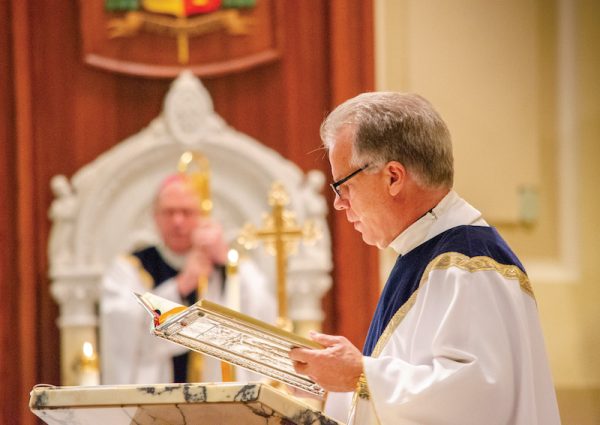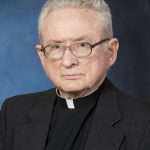Fr. Raymond Joyce lived later years quietly

Father Pat York prepares to take the Book of the Gospels to Bishop Carl A. Kemme after the reading at Father Raymond Joyce’s funeral. (Advance photo)
Father Raymond Joyce lived his later years in the diocese quietly after many years outside of the Diocese of Wichita, Bishop Carl A. Kemme said in a funeral homily Friday, Sept. 25, in the Cathedral of the Immaculate Conception in Wichita.
“He lived a long retirement among us in a quiet and unassuming way,” Bishop Kemme said. “My several conversations with him over the time I have been here were always pleasant and uplifting, and we were glad that he came to live at the Catholic Care Center, where we could take care of him properly in the last years of his earthly life.”
Father died on Sept. 12
Father Joyce, a priest of the Diocese of Wichita for 58 years, died Sept. 12.
Bishop Kemme said in our Catholic tradition, the seventh corporal work of mercy and the seventh spiritual work of mercy are related to the dead. “Corporally, we bury the bodies of the deceased and spiritually we pray for their blessed repose,” he said. “Attending funerals, it seems these days are a rare occurrence but it is an act of charity and mercy.”
He said praying and offering Masses for the deceased is also a great act of charity and mercy. “Perhaps, we are also losing that tradition as well, something we priests should do all we can to revitalize,” Bishop Kemme said.
That is why he and the other priests were gathered, he said, talking about his ordination, his service to the church as a priest, teacher, and chaplain.
It is always fitting to reflect on the Eucharist at a priest’s funeral, he said. “For the Eucharist, above all else, is the very heart and core of the priest’s life and ministry. It is what defines us and shapes who we are ordained to be. A priest is not a social worker, or therapist or guidance counselor, but rather one who offers sacrifice for and on behalf of the People of God.”
Priesthood flows from the Eucharist
Everything else associated with a priest must flow from the Eucharist, Bishop Kemme said.
“Father Joyce knew and lived those words well and for 58 years gave a concrete witness to them each day when he came to the altar and made this miracle present once again, for himself and for those who received the gift that was offered through his consecrated hands,” he said.
“No doubt the Eucharist, more than anything else, formed him into a priestly offering himself, holy and acceptable to God. This is what we priests, charged with offering the Mass each day, dare never forget, that this mystery must go well beyond function or formality, but must rather divinize us who take the bread and the cup and through the words of institution, transubstantiate them into Christ’s very Body and Blood, Soul and Divinity.”
Bishop Kemme closed his homily by saying that as we ponder the lives of the deceased at a funeral, we call upon the mercy of God for the deceased.
“Father Joyce now joins this countless host, waiting in hope and anticipation for the last day,” the bishop said. “And what is the source of that hope: the promise of Jesus that when we priests offer the Eucharist for the people, including ourselves, we will be raised on the last day.”
Father buried at St. Gregory’s
Father Joyce’s remains were buried Friday, Sept. 25, at St. Gregory’s Abbey in Shawnee, Oklahoma.
He was born on Sept. 2, 1935, in Philadelphia. He attended Catholic schools in St. Louis, Missouri, and studied for the priesthood at Kenrick-Glennon Seminary in St. Louis. He was ordained for the Diocese of Wichita on April 7, 1962, at the Cathedral Basilica of St. Louis.
Father Joyce first served as an assistant at All Saints Parish in Wichita. In 1963 he was named assistant at Church of the Magdalen in Wichita. He later served as an assistant at the Cathedral of the Immaculate Conception, St. Teresa Parish in Hutchinson, and as a religion teacher at Trinity Catholic High School in Hutchinson.
In 1968 Father Joyce began teaching at St. Gregory’s College in Shawnee. He became a chaplain for the U.S. Department of Veteran Affairs in 1985, and returned to the Diocese of Wichita in 1998 as a chaplain for Via Christi Medical Center. He retired on Oct. 1, 1998, and began serving as a volunteer for the medical center.

